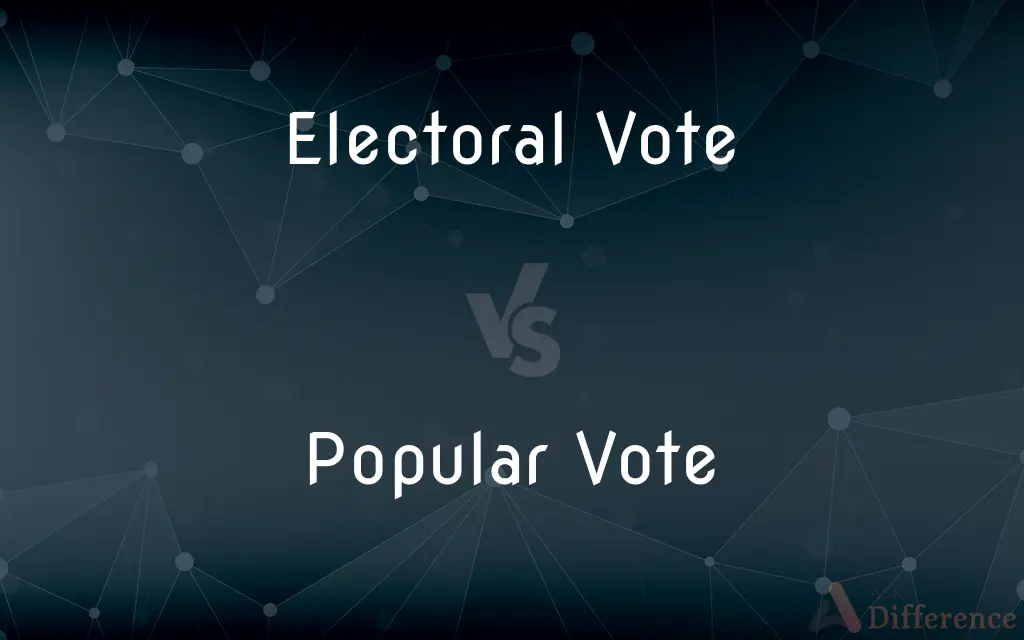Electoral Vote vs. Popular Vote — What's the Difference?
Edited by Tayyaba Rehman — By Fiza Rafique — Published on November 15, 2023
The Electoral Vote determines the outcome in the U.S. presidential election via electors, while the Popular Vote reflects the direct votes of individuals.

Difference Between Electoral Vote and Popular Vote
Table of Contents
ADVERTISEMENT
Key Differences
In U.S. presidential elections, both the Electoral Vote and the Popular Vote play significant roles, but they represent different mechanisms. The Electoral Vote stems from the Electoral College, a group of representatives, or electors, chosen by each state. These electors cast votes, which technically determine the presidency. Conversely, the Popular Vote signifies the direct votes cast by individual citizens for a presidential candidate.
A unique aspect of the U.S. system is that a candidate can win the Popular Vote but lose the election due to the Electoral Vote. This is because the Electoral College is designed to give every state, regardless of size, a voice in the election. Thus, even if a candidate secures a majority of direct votes, or Popular Vote, they may not secure enough electors to win the presidency.
The Electoral Vote is a winner-takes-all system in most states. For instance, if a candidate wins 51% of the Popular Vote in a state, they typically receive 100% of that state's Electoral Votes. This system can lead to disparities between the national Popular Vote tally and the electoral outcome.
To win the presidency, a candidate must secure a majority of the Electoral Votes. This doesn't always mirror the Popular Vote sentiment, leading to debates about the Electoral College's efficacy. Proponents argue it ensures balanced representation, while critics believe it can skew away from the majority's Popular Vote will.
In summary, while the Popular Vote represents the direct voice of the masses, the Electoral Vote, influenced by the Electoral College, ultimately determines the U.S. presidency. This distinction underscores the unique nature of the American democratic process.
ADVERTISEMENT
Comparison Chart
Definition
Votes cast by electors in the Electoral College.
Direct votes cast by individual citizens.
Determines
The outcome of the U.S. presidential election.
A reflection of the majority's choice.
Representation
Based on state representation; not always proportional to population.
Direct representation of individual votes.
Outcome Impact
Can differ from the Popular Vote.
Does not directly determine the election outcome.
System
Winner-takes-all in most states.
Cumulative total of all votes cast.
Compare with Definitions
Electoral Vote
Used exclusively in U.S. presidential elections.
The candidate focused on states with a high number of Electoral Votes.
Popular Vote
Does not directly decide the U.S. presidential outcome.
Despite winning the Popular Vote, the candidate lost the election.
Electoral Vote
Represents the collective decision of a state's electors.
The state has 20 Electoral Votes up for grabs in this election.
Popular Vote
Can sometimes contrast with the Electoral Vote outcome.
The Popular Vote favored one candidate, but the Electoral College decided otherwise.
Electoral Vote
Influenced by the state's Popular Vote, but can differ.
Despite losing the state's Popular Vote, the candidate secured its Electoral Vote.
Popular Vote
A reflection of the majority's choice in an election.
The Popular Vote indicated a close race between the two leading candidates.
Electoral Vote
A system that can lead to winning the presidency without a Popular Vote majority.
Historically, some presidents have secured the Electoral Vote without the Popular Vote.
Popular Vote
Represents the voice of individual voters.
There was a large Popular Vote turnout in this year's election.
Electoral Vote
A vote cast by an elector in the Electoral College.
Winning the Electoral Vote in key swing states is crucial for presidential candidates.
Popular Vote
The total number of direct votes cast by individual citizens.
The candidate secured the majority of the Popular Vote.
Common Curiosities
Do all states use a winner-takes-all system for the Electoral Vote?
No, Nebraska and Maine allocate Electoral Votes differently.
How often has the Popular Vote differed from the Electoral Vote outcome?
It's happened five times in U.S. history.
How many Electoral Votes are needed to win the presidency?
A candidate needs 270 Electoral Votes out of 538.
Can a candidate win the Popular Vote but lose the election?
Yes, if they don't secure enough Electoral Votes.
Why was the Electoral College system established?
It was a compromise to balance state and popular sovereignty.
Is the Popular Vote used in other countries?
Yes, many countries use a direct Popular Vote system for elections.
Why do some states have more Electoral Votes?
Electoral Votes are based on a state's total congressional representation.
What happens if there's a tie in Electoral Votes?
The U.S. House of Representatives would decide the presidency.
Can the Popular Vote influence electors' decisions?
Typically, electors vote as pledged, but "faithless electors" can deviate.
What reflects the direct will of the people, Electoral or Popular Vote?
The Popular Vote directly reflects the people's choice.
Share Your Discovery

Previous Comparison
Missouri Synod vs. ELCA
Next Comparison
Aided Colleges vs. Unaided CollegesAuthor Spotlight
Written by
Fiza RafiqueFiza Rafique is a skilled content writer at AskDifference.com, where she meticulously refines and enhances written pieces. Drawing from her vast editorial expertise, Fiza ensures clarity, accuracy, and precision in every article. Passionate about language, she continually seeks to elevate the quality of content for readers worldwide.
Edited by
Tayyaba RehmanTayyaba Rehman is a distinguished writer, currently serving as a primary contributor to askdifference.com. As a researcher in semantics and etymology, Tayyaba's passion for the complexity of languages and their distinctions has found a perfect home on the platform. Tayyaba delves into the intricacies of language, distinguishing between commonly confused words and phrases, thereby providing clarity for readers worldwide.
















































